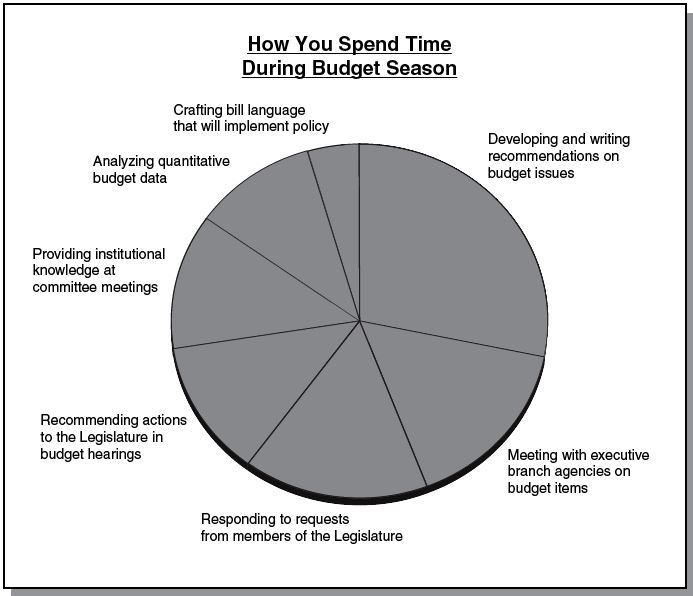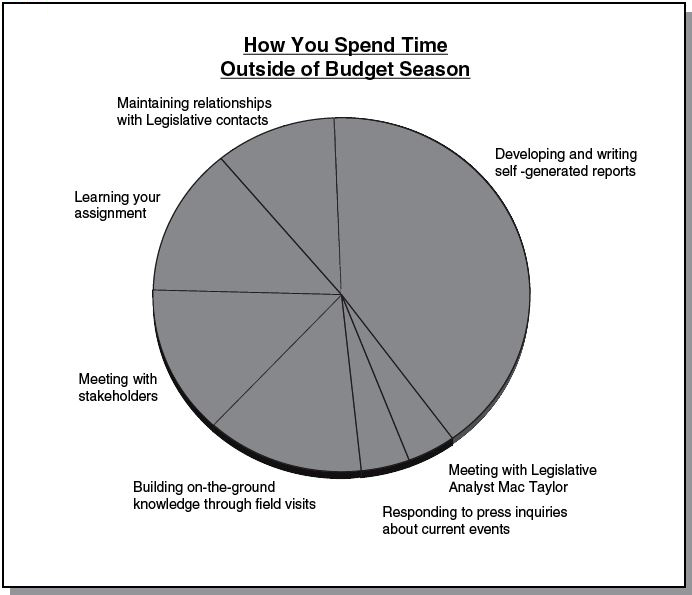Working at the LAO
A Day in the Life. . .
An analyst’s day at the Legislative Analyst’s Office (LAO) varies significantly depending on the time of year. Here’s what life would be like for an analyst covering resources issues at two points during the year.
Budget Season
Budget proposals. For the first couple of months of the year, your main focus is analyzing the budget proposals for the departments in your assignment. For example, the Department of Toxic Substance Control has requested using bond funds to replace a crumbling waste treatment facility. The Department of Water Resources has requested additional maintenance workers for the state water project. For a few days you read through the proposals, make a note of questions you have, and set up meetings. Discussions with department heads and budget analysts dominate the next few weeks so you can understand the proposals and analyze their merit on a fiscal and policy basis. Your recommendations will be written into a section-wide report, a more specific brief, or a handout distributed to members and staff of the Legislature. In early spring, you will have the opportunity to present these recommendations to budget subcommittees when you testify in hearings. In May, the departments come out with revised or additional proposals, and you participate in a more condensed version of the process.
Information requests. Throughout the year, but especially during budget season, you will respond to information requests from members of the Legislature. Responding to requests usually requires some research, a few meetings, and writing a short report, but may be more extensive. This time of year requests usually relate to the budget and might result in a handout about the solvency of the Beverage Container Recycling Fund or a memo recommending whether the money in the Off-Highway Vehicle Fund should be used to fund state park activities.
Special projects. By March you’ll start thinking about topics you might want to research independently when the budget season ends. You’ll pitch your ideas to your manager, and together you’ll create a work plan for the rest of the year.

Outside of Budget Season
Special projects. Now that the LAO’s budget work is mostly done, you’ll start to work on your special projects. On any given day this usually involves some research, setting up and conducting meetings to talk to stakeholders and the heads of state agencies and departments, and data collection and analysis. For a report on state park funding, you might visit a few state parks, talk to the executive team at the Department of Parks and Recreation, research funding mechanisms used by other states’ park systems, and talk to foundations and non-profit organizations that partner with Department of Parks and Recreation. You will analyze data provided by the department and use your findings to recommend actions that the Legislature can take to increase the efficiency or decrease the cost of state operations. The report you write on the topic will go through several versions of outlines and drafts, and you’ll meet with your management team and Mac multiple times before you finish to make sure your analysis is well-supported and analytically sound. After the report or brief is published, you will present the report to legislative staff and answer calls from members of the media or other interested groups.
Site visits, issue hunting, and learning your assignment. In the fall you have time to go see your departments in action. Analysts visit operations all over the state, including schools, healthcare providers, prisons, highway projects, state parks, fire camps, and courthouses to better understand what the state does and determine if there are any problems or potential improvements that should be brought to the attention of the Legislature or that may come up during budget season. This is a great time to strengthen relationships with departments, stakeholders, and other policy and budget staff of the Legislature. Like a journalist, you’re on the hunt for potential issues and useful contacts.
Ballot Measures. You might be assigned a ballot measure to analyze for the California Voter Guide. After reading the measure, you will meet with proponents, opponents, the Office of Legislative Counsel, and other experts to understand what the ballot measure would do and determine how much money it would cost (or save) state and local governments. You’ll write a description of the measure and its fiscal impact, which will be presented to the Legislature and printed in the Voter Guide, which is mailed to the home of every registered voter in the state.
Information requests. Members of the legislature will continue to ask you for memos and briefs about various topics. These can be short (like a table that shows the state’s firefighting costs for the past ten years) or pretty lengthy (like a formal report on the implementation of the state’s cap–and–trade program).
